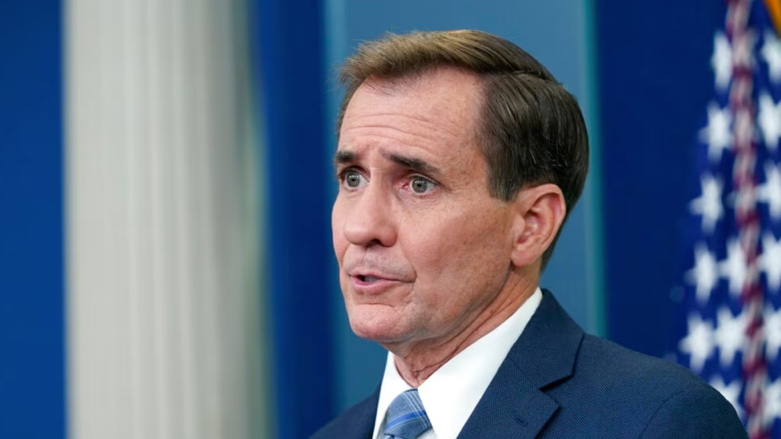US describes ‘unprecedented’ Russia-Iran military ties on first anniversary of Ukraine war

WASHINGTON DC, United States (Kurdistan 24) – Speaking to reporters on Friday, the first anniversary of Russia’s assault on Ukraine, John Kirby, Coordinator for Strategic Communications at the National Security Council, described how the war was leading to ever-closer military ties between Moscow and Tehran.
Kirby, a retired US Navy Rear Admiral, is the most authoritative US spokesperson on national security matters.
The protracted war in Ukraine is exhausting Russian arms supplies, and Moscow is turning to Iran, among other countries, to replenish those supplies. In return, as Kirby explained, Russia is providing Iran with new weapons systems, which may include advanced fighter jets.
In fact, The New York Times reported last week that Iran was preparing to receive the Sukhoi Su-35. If delivered, the plane would represent Iran’s “most significant upgrade to its aging fighter jet fleet in decades,” the Times said.
Read More: Iran preparing to receive advanced Russian jets; reflects closer ties, driven by Ukraine war—report
“Russia has been offering a lot of unprecedented defense cooperation” to Iran, “including on missiles, electronics and air defense” Kirby said on Friday.
First Report of Iranian Weapons for Russia: July 2022
It was last July when the US first said that Moscow was about to obtain a significant number of Iranian drones. Indeed, they began to arrive the following month, as Russian transport planes “quietly picked up the first of scores of Iranian-made combat drones for use against Ukraine,” The Washington Post reported then.
As the drone shipments began, CIA Director William Burns, reflecting a serious misunderstanding of Iran within the US intelligence community, warned “against overestimating Moscow’s alignment with Tehran,” as the well-regarded Middle East news website, Al-Monitor, reported on Friday.
Of course, that assessment proved quite wrong, and a few months later, the US view changed, as it came to see the alignment between Moscow and Tehran as a serious matter, with, potentially, major consequence.
Thus, Kirby explained on Friday that the increasing military cooperation between Tehran and Moscow affected not only the war in Ukraine, but might also have an impact on the Middle East.
It “could certainly make the security situation” in that region “more difficult for our friends and partners there,” Kirby stated.
US, Allies Mark First Anniversary of Ukraine War
The top national security issue for the US and Europe now is Russia’s assault on Ukraine. On Thursday, they sponsored a resolution in the UN General Assembly, condemning Moscow’s attack, which was approved overwhelmingly.
On Friday, the leaders of the G-7 (Canada, France, Germany, Italy, Japan, UK, US) met virtually with Ukrainian President Volodymyr Zelensky to reaffirm their “unwavering support for Ukraine for as long as it takes.”
The very strong statement of support issued after the meeting included a warning to Russia against the use of any weapons of mass destruction.
At various points in the Ukraine crisis, Moscow has hinted at the possibility that it might respond with a nuclear attack, and the G-7 statement addressed that threat.
“We reiterate that Russia’s irresponsible nuclear rhetoric is unacceptable,” the statement affirmed. “Any use of chemical, biological, radiological or nuclear weapons by Russia would be met with severe consequences.”
The statement also raised the prospect that senior Russian officials, including Vladimir Putin, might face criminal trials for the actions of Russian forces in Ukraine.
“We are united in our determination to hold President Putin and those responsible to account, consistent with international law,” it said, adding, “we support investigations by the Prosecutor of the International Criminal Court, the Prosecutor-General of Ukraine, and other national prosecutors who are able to establish jurisdiction under national law.”
That is certainly a position supported by Washington. Last Saturday, at the Munich Security Conference, Vice President Kamala Harris announced that the US had determined that “members of Russia’s forces and other Russian officials have committed crimes against humanity in Ukraine,” according to a White House statement.
In addition, on Friday, the Pentagon announced a new $2 billion military aid package for Ukraine.
